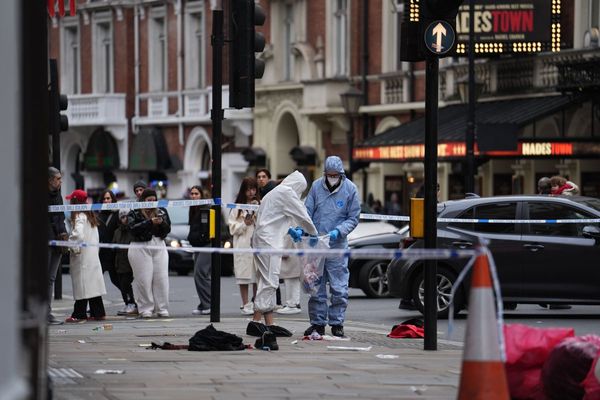
Kyiv (Ukraine) (AFP) - Russia stepped up air strikes on Kyiv on Saturday, killing at least one person at a tank factory a day after Moscow warned it would renew attacks following two weeks of relative calm in the Ukrainian capital.
The fresh bloodshed in Kyiv came as President Volodymyr Zelensky warned that the elimination of the last Ukrainian troops trapped in the besieged southern port of Mariupol would put an end to stalled peace talks with Moscow.
"The elimination of our troops, of our men (in Mariupol) will put an end to any negotiations" between Ukraine and Russia, Zelensky said in an interview with the Ukrainska Pravda news website.
"That will be an impasse as we don't negotiate neither our territories nor our people."
Peace talks have continued since early in the fighting but offered no concrete results.
Russian officials have said they are in full control of the besieged and ruined port city of Mariupol, although Ukrainian fighters are still holed up in the city's fortress-like steelworks.
In Kyiv, mayor Vitali Klitschko said at least one person was killed and several wounded in the latest attack.
Smoke rose from the Darnyrsky district in the southeast of the capital after what Moscow said were "high-precision long-range" strikes on the armaments plant.
"Our forces are doing everything possible to protect us, but the enemy is insidious and ruthless," Klitschko said.
"It's no secret that a Russian general recently said they were ready for missile attacks on the capital of Ukraine.And, as we see, they are carrying out such shelling."
A heavy police and military presence was deployed around the factory, the day after a similar strike on a plant that produced the Neptune missiles Kyiv and Washington say sunk Russia's Black Sea naval flagship on Thursday.
Russia, which used sea-based long-range missiles to hit the Vizar plant on Friday, says the Moskva missile cruiser sank while being towed back to port after ammunition exploded on board.
A Russian missile strike on a residential district of Ukraine's second-largest city Kharkiv, in the northeast of the country, killed at least two people and wounded 18 on Saturday, the public prosecutor's office said.
Amid escalating tit-for-tat sanctions since President Vladimir Putin invaded Ukraine on February 24, Russia on Saturday said it was banning entry to British Prime Minister Boris Johnson and several other top UK officials.
"This step was taken as a response to London's unbridled information and political campaign aimed at isolating Russia internationally, creating conditions for restricting our country and strangling the domestic economy," the foreign ministry said in a statement.
The ministry accused London of "unprecedented hostile actions", in particular referring to sanctions on Russia's senior officials, and "pumping the Kyiv regime with lethal weapons".
Sanctions
Britain has been part of an international effort to punish Russia with asset freezes, travel bans and economic sanctions, and Moscow's new entry blacklist includes Deputy Prime Minister Dominic Raab, Foreign Secretary Liz Truss, and Defence Secretary Ben Wallace.
Saturday's strike on the Ukrainian capital was among the first since invading Russian forces began withdrawing from regions around Kyiv last month, instead turning their focus on gaining control of the eastern Donbas region.
Kyiv regional governor Oleksandr Pavliuk said there were at least two other Russian strikes on the city Friday and that civilians thinking about returning should "wait for quieter times".
Nevertheless, families and off-duty soldiers were out in the parks and on the terraces of central Kyiv on Saturday, bringing a semblance of normality to the once-bustling city.
"It's the first time we've been back in the city centre.We wanted to see if public transport was working and people-watch.It's really making me happy to see people out and about," 43-year-old vet Nataliya Makrieva told AFP.
A Pentagon official said that the sinking of the Moskva, which had been leading Russia's naval effort in the seven-week conflict, was a "big blow" for Moscow, while the fate of its crew of more than 500 was uncertain.
Focus on east
Zelensky said on Friday that between 2,500 and 3,000 Ukrainian soldiers had been killed in the conflict so far, compared to 19,000-20,000 Russian dead.
He said that around 10,000 Ukrainian soldiers had been wounded, and that it was "difficult to say how many will survive".
Russia has so far detained around 1,000 Ukrainian civilians and captured 700 soldiers, Ukraine's Deputy Prime Minister Iryna Vereshchuk said, while Ukraine has captured around 700 Russian soldiers.
Nine humanitarian corridors were to be opened on Saturday to allow civilians to flee the fighting, including from Mariupol, the UNIAN news agency quoted her as saying.
At least 200 children have been killed in the Russian offensive and another 360 wounded, the public prosecutor said.
In Geneva, the UN refugee agency warned that many of the nearly five million people who have fled Ukraine will not have homes to return to, as another 40,000 fled the country in 24 hours.
"People's greatest wish is to go back home.But for so many, there is no home to return to since it's been destroyed or damaged, or is located in an area that is not safe," said Karolina Lindholm Billing, UNHCR's representative in Ukraine.
Russia's military focus now seems to be on seizing the eastern Donbas region, where Russian-backed separatists control the Donetsk and Lugansk areas.
This would allow Moscow to create a southern corridor to the occupied Crimean peninsula, and Ukrainian authorities have been urging people in the region to quickly move west in advance of a large-scale Russian offensive.
Lugansk governor Serhiy Gaidai called Saturday for civilians to leave the area while they still can.
"Evacuate, while there's still an opportunity," he wrote on Telegram, warning that they might be used as human shields if they remain.
Russian forces on Saturday attacked an oil refinery outside Lysychansk, a town near the front line in eastern Ukraine, sending plumes of black smoke into the sky.
burs-cjo/har







